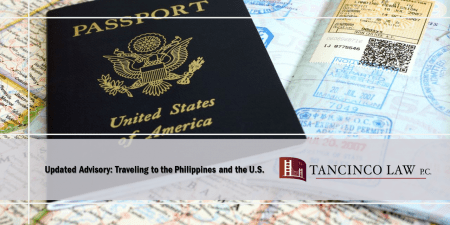Traveling to the Philippines
According to IATF Resolution No. 97 released on January 28, 2021, U.S. citizens or non-Filipinos who are not dual citizens and naturalized U.S. citizens are not allowed to enter without valid Philippine visas among other requirements.
The resolution states that non-Filipinos may enter the Philippines, subject to the following conditions:
- With valid and existing visa at the time of entry;
- With pre-booked quarantine accommodation for at least seven nights in an accredited quarantine hotel/facility;
- Subject to COVID-19 testing on sixth day from date of arrival; and
- Subject to maximum capacity of inbound passengers at the port and date of entry.
Note that those with no Philippine passports but with valid visas who fall under the following categories will be allowed entry into the Philippines subject to the same requirements above:
- Foreign spouses of Filipino nationals; or
- Foreign parents of minor Filipino children and of Filipino children with special needs, regardless of age.
Those who comply with the above and who are allowed to enter the Philippines will have to comply with the mandatory 7 days quarantine upon arrival at approved Department of Health (DOH) facilities. This rule applies despite negative COVID tests upon arrival. On the sixth (6th) day of arrival, the traveler will have to take a mandatory COVID-testing.
Make sure before traveling and before making a hotel reservation that the hotel is an accredited quarantine hotel/facility by the Philippine Department of Health. For a list of accredited quarantine hotels and facilities, travelers should exercise due diligence by researching only on reputable information sources. Or they may contact their airlines for any list or their partner quarantine hotels for recommendation.
Traveling to the United States
All airline passengers traveling to the United States, including U.S. citizens and Lawful Permanent Residents (LPRs), are required to provide proof of a negative COVID-19 viral test or recovery from COVID-19.
Effective January 26,2021 all airline passengers to the United States ages two years and older must provide either a negative COVID-19 viral test taken within three calendar days of travel or provide a positive test result and documentation from a licensed health care provider or public health official of having recovered from COVID-19 in the 90 days preceding travel. Passengers must also attest, under penalty of law, to having received a negative qualifying test result or to recovery from COVID-19 and medical clearance to travel.
Airlines must deny boarding to passengers who do not meet these requirements. U.S. citizens in countries where adequate COVID-19 testing is not available or may not be able to satisfy the requirements, should depart immediately or prepare to be unable to return to the United States until such time as they can meet the requirements.


